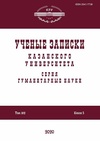Наследие А.Б. Рановича в контексте изучения государства Хасмонеев
A.B. Ranovich’s Legacy in the Context of Studying the Hasmonean State
Author(s): M.N. KaranaevSubject(s): Christian Theology and Religion, Jewish studies, Sociology, Social history, Sociology of Religion
Published by: Казанский (Приволжский) федеральный университет
Keywords: A.B. Ranovich; E. Bickerman; historiography; Hasmonean state; Judaic studies; Hellenism;
Summary/Abstract: This article examines the views of A.B. Ranovich, a prominent Soviet historian of antique civilizations, on the Hasmonean state by analyzing his works through the lens of the epoch and, simultaneously, as opposing Soviet and “ ourgeois” history. his approach opens up new perspectives for the interpretation of how the scholar turned his attention from Christianity to Hellenism. A possible explanation may be that the first scholarly quest for the historical Jesus and the Christ myth theory, promoted by A.B. Ranovich in particular, led their adherents to a deadlock. They finally broke through it with the discovery of the Qumran Caves Scrolls (1948) and the development of new methods of studying the early Christian texts, i.e., after the death of A.B. Ranovich. It is of peculiar interest to get an insight into what thoughts A.B. Ranovich had a out E. Bic erman and V. heri over’s wor s ecause they all had a similar prerevolutionary experience (Jewish background, traditional Jewish lifestyle in families, secular education, and membership in the academic community). The analysis shows that A.B. Ranovich was critical of “ ourgeois” historians and refused their approach to studying ewish history. However, this made him focus on the socio-economic features of the Hasmonean state and thus he proved that the Hellenistic states encouraged slavery. A.B. Ranovich’s wor “Hellenism and Its Historical Role” testifies to his unique concern about the history of the Jews, although it was outwardly shunned. The conclusion is made that A.B. Ranovich preferred not to publicly identify and portray himself as a Jewish historian, but his reasoning, regardless of the numerous ideological clichés and constructs, was uilt on the Jewish traditions that he knew.
Journal: Ученые записки Казанского университета. Серия Гуманитарные науки
- Issue Year: 164/2022
- Issue No: 6
- Page Range: 95-107
- Page Count: 13
- Language: Russian

